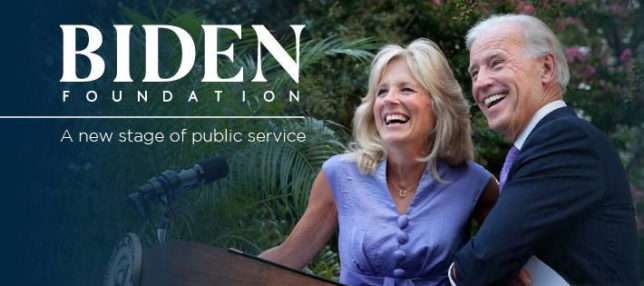Organization Trends
Nonprofits in the Biden Administration: Foundations and Philanthropy
 Credit: David Lkonemann/White House.
Credit: David Lkonemann/White House.

The Capital Research Center maintains a detailed InfluenceWatch profile on the Biden Administration, noting especially the professional backgrounds and associations of the president’s nominees and appointees to positions in the federal government. This post is the fourth in an occasional series on those associations.
Nonprofits in the Biden Administration
Think Tanks | Special Interest Groups
Arabella Advisors and Democracy Alliance
Foundations and Philanthropy | Federal Courts
Soon after President-elect Joe Biden announced the composition of his transition’s agency review teams, the Capital Research Center’s Michael Hartmann observed that more than 20 team members were “identified as being employed by left-of-center philanthropic foundations or grantmaking entities.” This trend continued post-inauguration, with many foundation alumni taking jobs in the administration.
The Biden and Obama Foundations
The administration could draw from some obvious sources, such as the now-defunct Biden Foundation (technically a 501(c)(3) nonprofit, not a private foundation), which shuttered in 2019. Its former executive director, Louisa Terrell, now serves as director of the White House Office of Legislative Affairs. Gautam Raghavan, now deputy director of the Office of Presidential Personnel, served as an advisor to the Biden Foundation in addition to his role as former vice president of policy at the Gill Foundation. Deputy Secretary of State for management and resources Brian P. McKeon also served for a time as a Biden Foundation advisor.
The Obama Foundation—another 501(c)(3) nonprofit established to oversee several post-presidential projects including the Obama Presidential Center in Chicago—also provided a number of high-ranking staff to the Biden administration. Wally Adeyemo, the Obama Foundation’s president since August 2019, is now deputy secretary of the Treasury. The foundation’s former chief operating officer Anne Filipic is now director of management and administration in the White House. Dana Remus, now White House counsel, was the Obama Foundation’s general counsel prior to joining Biden’s presidential campaign in that same role. National Security Council Chief of Staff Yohannes Abraham previously served as the foundation’s interim chief operating officer.
Big Philanthropy
Numerous other Biden administration officials have come via the philanthropic world, including some from prominent left-of-center foundations and grantmakers.
Several appointees had prior roles at George Soros’s Open Society Foundations (OSF). White House Deputy Cabinet Secretary Cristobal Alex was a program officer at both OSF and the Ford Foundation. Sarah Cross, now deputy assistant secretary in the State Department’s Bureau of Population, Refugees, and Migration, was OSF’s international migration initiative advocacy director. Jenny Yang, director of the Office of Federal Contract Compliance Programs at the Department of Labor, and Chiraag Bains at the Domestic Policy Council, were OSF leadership in government fellows in 2018 and 2017, respectively.
Kiran Ahuja’s confirmation as director of the Office of Personnel Management required Vice President Kamala Harris’s tiebreaking vote in part due to her record as chief executive officer of the Philanthropy Northwest network. Among the concerns raised with Ahuja’s nomination was an article she wrote for the organization’s website declaring “that all forms of discrimination flow from the subjugation of Black and Indigenous people.” Philanthropy Northwest’s member organizations collectively represent almost 50 percent of philanthropic assets in the states of Alaska, Idaho, Montana, Oregon, Washington, and Wyoming.
The Markle Foundation was a source of multiple administration personnel. Secretary of Veterans Affairs Denis McDonough; David Marsh, senior advisor to the chief of staff at the Office of Personnel Management; Michele Chang, deputy assistant secretary for policy at the Economic Development Administration; and Juliana Herman, chief of staff in the Department of Education’s Office of Planning, Evaluation, and Policy Development, are all former Markle staff.
Other examples can be found across the executive branch. White House Deputy Chief of Staff Bruce Reed was president of the Broad Foundation from 2013 to 2015. Ben J. Winter, deputy assistant secretary at the Department of Housing and Urban Development, formerly worked at the California Community Foundation. Shannon Estenoz, the Interior Department’s Assistant Secretary for Fish and Wildlife and Parks, was most recently chief operating officer at the Everglades Foundation.
Shara Mohtadi, chief of staff in the Energy Department’s Office of Energy Efficiency and Renewable Energy, came from Bloomberg Philanthropies. Erika Poethig, now working on housing and urban policy at the Domestic Policy Council, once worked on similar issues at the John D. and Catherine T. MacArthur Foundation. Under Secretary of State for Arms Control and International Security Affairs Bonnie Jenkins was a past program officer at the Ford Foundation, while Jane Flegal, senior director for industrial emissions at the Council on Environmental Quality, held prior jobs at the Hewlett Foundation and the Bernard and Anne Spitzer Charitable Trust.
Billionaire-Backed LLCs
Structuring one’s philanthropic ventures as an LLC, rather than as a more traditional nonprofit or foundation, is a trend that has seen growing use among the super-wealthy. Doing so provides operational and grantmaking flexibility while keeping financials confidential. LLCs are not required to file yearly tax-exempt disclosures with the IRS. The increasing popularity of this philanthropic structure is illustrated by several notable Biden administration hires.
Perhaps the most well-known philanthropic LLC is the Chan Zuckerberg Initiative, established by Facebook billionaire Mark Zuckerberg and his wife Priscilla Chan. According to its website database, it has awarded nearly $3 billion in grants since 2015 through several funding vehicles. In the Biden White House’s Office of Management and Administration, both Director David Recordon and Deputy Director of Technology Austin Lin came from positions at the Chan Zuckerberg Initiative.
Less well-known is what the Washington Post has described as “perhaps the most influential product of Silicon Valley that you’ve never heard of.” The Emerson Collective was founded in 2004 by Laurene Powell Jobs, who Inside Philanthropy dubbed 2019’s “Least-Transparent Mega Giver,” in part due to the opacity of the Emerson Collective’s financials. The organization’s ideology has been characterized as “center-left politics with a dash of techie libertarianism.” In 2016 it gave $2.5 million to Priorities USA Action, a major Democratic Party super political action committee (PAC). Carmel Martin, now deputy director of the Domestic Policy Council for economic mobility, was managing director of state and local partnership at the Emerson Collective from 2017 to 2019.
In addition to sitting on the board of the left-of-center Century Foundation, Anne Milgram, administrator of the Drug Enforcement Administration, headed the criminal justice initiative at the Laura and John Arnold Foundation from 2011 to 2015. In 2019—a year in which the Arnold Foundation reported over $2.3 billion in assets and paid out about $211 million in grants—the Arnolds announced the creation of a LLC called Arnold Ventures to manage their various entities under one umbrella.
A Left-Progressive Reservoir
As Hartmann noted when analyzing the transition teams, George Mason University Professor Alan Abramson remarked that the Biden administration evidentially viewed philanthropy as “a storehouse of knowledge and experts.” Although likely not self-evident to the average voter, the administration’s affinity for foundation staff would probably not surprise William Schambra, who has long observed “that virtually every institution within philanthropy’s professional, educational, and consulting infrastructure is imbued with progressive political sentiments and staffed with progressive activists.” It’s no wonder then, that many have now found jobs in Washington.



